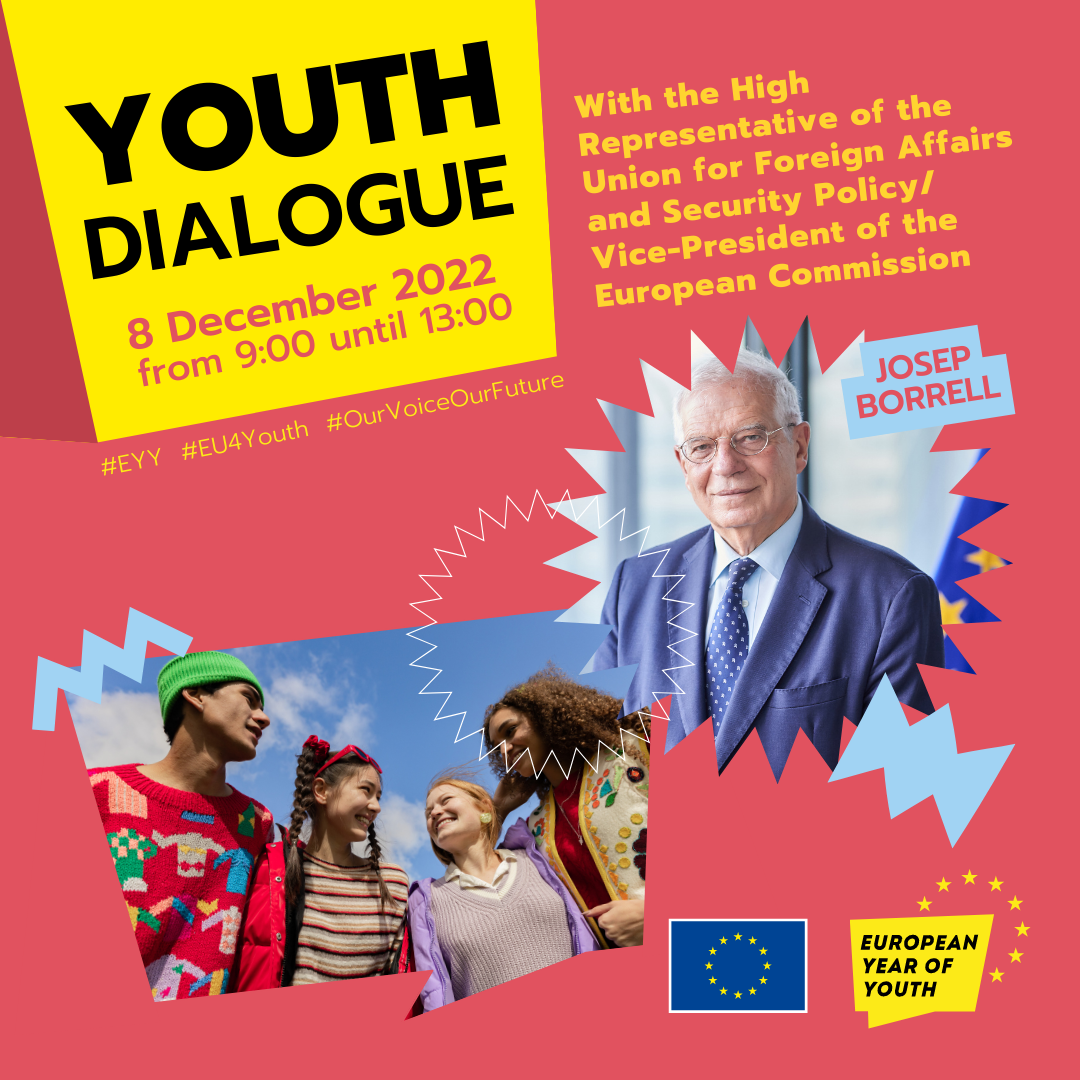Policy Dialogue with High Representative/Vice-President Josep Borrell: "Engaging the youth in global politics: towards a stronger Europe in a changing world"
 @European Union, 2022
@European Union, 2022
08/12/2022 11:00
08/12/2022 13:00
[CET] Central European Time
To mark the 2022 European Year of Youth, European Commissioners are meeting with young people to hear their concerns, perspectives and proposals to tackle some of todays’ most pressing challenges. In this framework the High Representative/Vice-President, Josep Borrell, chaired on 8 December 2022 a dialogue with 15 young people from 18 to 35 years old and with an interest in foreign policy. The participants came from different geographical (EU and non-EU), cultural and societal backgrounds. These young leaders engaged with HRVP Borrell on a dialogue and had the opportunity to share their views on key topics relevant for EU foreign policy.
Topics tackled included the green transition, public diplomacy and youth engagement, disinformation, defense, the promotion of peace and security, and human rights.
The objectives of the dialogue with young people were to:
- Host a platform where the young leaders of tomorrow could present and discuss with the HR/VP youth initiatives that play (or could play) a role in foreign affairs.
- Bring together young experts and today’s policy makers, forging a constructive dialogue on the future of the European Union in the world.
- Discuss the role of youth on EU foreign affairs and share a young vision for the future of the EU, as the leaders of tomorrow.
This policy dialogue was not livestreamed.
Take aways from the Dialogue
The young participants showed high interest in EU external policies and action, most particularly in the areas of 1) A youth approach under EU, 2) Youth participation in External Action, 3) Cultural exchanges between Europe and the World and 4) Living conditions of youth worldwide.
- A youth approach to EU Foreign Policy, including Security and Defence. Some participants raised that the concept of security is not limited to military operations and includes broader issues such as climate change, economics or social well-being. Some participants defended the need to extend the use of qualified majority voting at the Council of the EU, to allow the EU to take faster decisions on EU Foreign, Security, and Defence policy, when necessary. The participants also raised the importance of continue expanding and strengthening EU’s partnerships with countries across the world.
- Youth participation in External Action. As a generation familiar with the present and the future of our world, youth deserves to have a central role in decision-making processes about external action. Youth is at the frontline in any conflict and the EU Youth Action Plan is an example of how the EU could further incentivise young people’s participation in EU External policies and action. The participants flagged the importance of new ways of participation to be explored by European institutions and Member States to help young people raise their voice. Participation is not only a right but should be considered a responsibility. In this sense, the participation of young Europeans in elections is particularly important for healthy representative democracies.
- Cultural exchanges between Europe and the World. During the dialogue it was highlighted how culture is not only about arts or literature, but it is a much broader concept that embraces traditions, heritage, mutual understanding, history and knowledge at large. As a region with a rich and diverse culture, Europe has a lot to offer to the world. To do so, cultural diplomacy, including the launch of joint international initiatives and people-to-people exchanges are extremely important. Participants praised initiatives like Erasmus+ as an example of what could be done at a broader scale.
- Living conditions of youth worldwide. During the dialogue the participants addressed the fact that young generations are among the most vulnerable to the instability of labour markets and too often suffer from precarious working conditions. The inclusion of the youth perspective across policy priorities is essential, including in EU’s external action.
Activity details
| Activity format | With face-to-face presence |
| Starts on | 08/12/2022 11:00 |
| Ends on | 08/12/2022 13:00 |
| Timezone | [CET] Central European Time |
| Organised by | European Commission |
| Target age range | 18-24; 25-30; 31-35 |
| Language of the activity | English |
| Type of activity | Debate |
| Activity topics | Participation & engagement; Youth and the world |
| Youth Goals this activity is linked to | Connecting EU with Youth |
| Related to the Conference on the Future of Europe | No |
| Number of expected participants (estimate) | 15 |